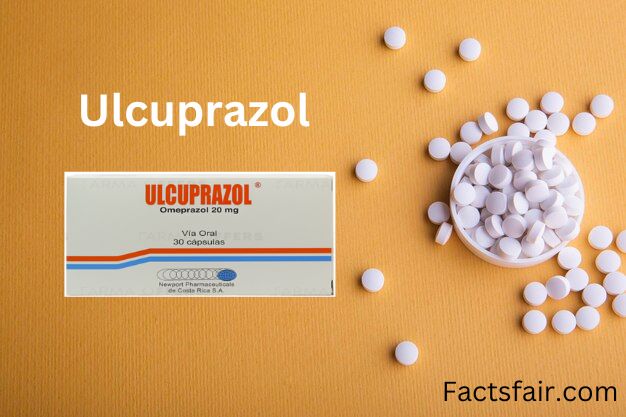What is Ulcuprazol?
Proton pump inhibitors (PPIs), a type of medication intended to lessen the production of stomach acid, include ulcuprazol. It contains the active component omeprazole, which is essential for reducing the amount of acid the stomach produces. It is available as tablets, capsules, powder for oral suspension, and injections, among other forms. It is available in different forms, such as:
- Packets: 2.5 mg and 10 mg
- Suspension: 2 mg/ml
- Tablets: 20 mg
- Capsules: 10 mg, 20 mg, and 40 mg
- Injections: 40 mg

Uses of Ulcuprazol
Ulcuprazol, a proton pump inhibitor (PPI), is widely used to reduce stomach acid production, offering relief from conditions like heartburn, acid reflux, and various digestive issues. This section outlines its common applications:
- Relief from Acid-Related Symptoms
It effectively alleviates symptoms associated with excess stomach acid, including heartburn, chest pain, swallowing difficulties, coughing, and regurgitation. By reducing stomach acid levels, it provides relief from these discomforting symptoms.
- Treatment of Gastric Ulcers with Ulcuprazol
It is a proton pump inhibitor (PPI), that diminishes stomach acid production, aiding ulcer healing and prevention. It’s particularly effective for gastric ulcers caused by H. pylori infection. The recommended dose is 20mg once daily before breakfast, taken as a whole tablet with water, not crushed or chewed. Doctors may also prescribe antibiotics alongside Ulcuprazol upon confirming H. pylori infection through diagnostic tests.
Dosage and Administration
Okay, now, let’s discuss those numbers you’ve been curious about. We’re talking about the recommended daily Ulcuprazol dosage for pediatric patients aged 1 to 16. We’re going to break it down by weight, making it super easy to understand.
- Featherweights (5 kg – 10 kg)
For the little ones who tip the scales between 5 and 10 kilograms, the recommended dosage is 5 milligrams. Yep, you heard it right – 5 mg, and they’re good to go.
- Middle of the Road (10 kg – 20 kg)
Now, if your kiddo falls into the 10 to 20-kilogram category, it’s time for a bump up. They should be taking 10 milligrams of it. It’s all about finding that sweet spot for their weight.
- Heavy Hitters (20 kg and Beyond)
The children who weigh 20 kilograms or more and are the heavyweight champions will also take 20 milligrams of it.
The Magic Mechanism
So, how does Ulcuprazol work its wizardry? The main act is all about inhibiting those pesky gastric acid-producing enzymes – the proton pumps. These little troublemakers are the culprits behind releasing hydrochloric acid into your stomach, aiding in food digestion.
By throwing a spanner in the works, Ulcuprazol puts the brakes on the proton pumps, effectively cutting down the acid production. The result? Your stomach’s pH levels rise, and those damaged tissues from acid overload start healing. But wait, there’s more!
Beyond the Basics
It turns out that Ulcuprazol isn’t a one-trick pony. Alongside its primary mission of being an acid-buster, it’s also got some impressive anti-inflammatory powers. So, if you’re dealing with gastritis or esophagitis, consider Ulcuprazol your trusty sidekick in reducing inflammation.
Ulcuprazol Unwrapped
Now that you’ve got the lowdown on Ulcuprazol’s superpowers, let’s take a closer look at what this wonder drug is all about. It is part of the proton-pump inhibitor (PPI) family, renowned for taming excessive stomach acid production. It’s your go-to if you’re battling GERD or peptic ulcers. The star of the show here is omeprazole, the active ingredient that knows how to keep those gastric acid secretions in check. In case you’re wondering, Ulcuprazol comes in various forms – tablets, capsules, powder for oral suspension, and even injections.
Approved, Tested, and Trusted
Now, you might be thinking, “Is Ulcuprazol legit?” Absolutely. Major regulatory bodies like the United States Food and Drug Administration (FDA) have given it the green light for safety and efficacy. It’s undergone extensive testing and aced the exams for managing excess stomach acid-related conditions.
The Inner Workings
Let’s demystify how Ulcuprazol does its thing. The main act is all about inhibiting an enzyme called H+/K+-ATPase, found on those gastric parietal cells. These cells are the true culprits behind stomach acid production. By telling this enzyme to take a break, Ulcuprazol steps in and puts the brakes on stomach acid production. This translates to relief from pesky symptoms like heartburn, regurgitation, and chest pain.
Potential Side Effects
The side effects of Ulcuprazol include the following: headache, abdominal pain, diarrhea, nausea, vomiting, gas (flatulence), dizziness, upper respiratory infection, acid reflux, constipation
- Less common side effects:
Bone fracture (osteoporosis-related), deficiency of granulocytes in the blood, loss of appetite, hair loss
- Rare side effects
Rare side effects include liver damage, inflammation within the kidney, pancreatitis
FAQ’s
- Is Ulcuprazol available over the counter?
No, Ulcuprazol is a prescription medication and should be used under the guidance of a healthcare professional.
- How long does it take for Ulcuprazol to work?
The onset of relief varies, but many individuals experience improvement within a few days.
- Are there any dietary restrictions while taking Ulcuprazol?
Grapefruit and grapefruit juice should be consumed in moderation since they may interact with the medication.
- Can Ulcuprazol be taken during pregnancy or while breastfeeding?
It’s important to consult your doctor if you are pregnant or nursing, as the safety of Ulcuprazol in these situations is not well-established.
Read more:
MyUHCMedicare HWP Account Login: Your Comprehensive Guide
